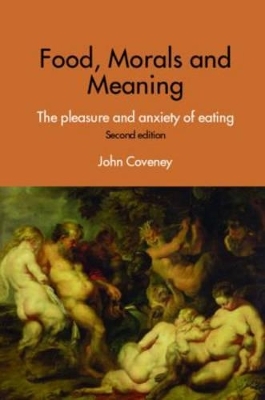
Food, Morals and Meaning
The Pleasure and Anxiety of Eating
Seiten
2006
|
2nd edition
Routledge (Verlag)
978-0-415-37621-1 (ISBN)
Routledge (Verlag)
978-0-415-37621-1 (ISBN)
Traces our complex relationship with food and eating and our preoccupation with diet, self-discipline and food guilt. Exploring why our appetite for food pleasures makes us feel anxious, this book is useful for those studying nutrition, public health, sociology of health and illness, and sociology of the body.
First published in 2006. Food, Morals and Meaning examines our need to discipline our desires, our appetites and our pleasures at the table. However, instead of seeing this discipline as dominant or oppressive it argues that a rationalisation of pleasure plays a positive role in our lives, allowing us to better understand who we are. The book begins by exploring the way that concerns about food, the body and pleasure were prefigured in antiquity and then how these concerns were recast in early Christianity as problems of 'natural' appetite which had to be curbed. The following chapters discuss how scientific knowledge about food was constructed out of philosophical and religious concerns about indulgence and excess in 18th and 19th Century Europe. Finally, by using research collected from in-depth interviews with families, the last section focuses on the social organisation of food in the modern home to illustrate the ways that the meal table now incorporates the principles of nutrition as a form of moral training, especially for children. Food, Morals and Meaning will be essential reading for those studying nutrition, public health, sociology of health and illness and sociology of the body.
First published in 2006. Food, Morals and Meaning examines our need to discipline our desires, our appetites and our pleasures at the table. However, instead of seeing this discipline as dominant or oppressive it argues that a rationalisation of pleasure plays a positive role in our lives, allowing us to better understand who we are. The book begins by exploring the way that concerns about food, the body and pleasure were prefigured in antiquity and then how these concerns were recast in early Christianity as problems of 'natural' appetite which had to be curbed. The following chapters discuss how scientific knowledge about food was constructed out of philosophical and religious concerns about indulgence and excess in 18th and 19th Century Europe. Finally, by using research collected from in-depth interviews with families, the last section focuses on the social organisation of food in the modern home to illustrate the ways that the meal table now incorporates the principles of nutrition as a form of moral training, especially for children. Food, Morals and Meaning will be essential reading for those studying nutrition, public health, sociology of health and illness and sociology of the body.
John Coveney
Preface to Second Edition Preface 1. Foucault, Discourse, Power and the Subject 2. Governmentality of Modern Nutrition 3. Greeks to the Christians: From Ethics to Guilt 4. Religion and Reason: The Emergence of a Discourse on Nutrition 5. Paupers, Prisoners and Moral Panics 6. The Nutritional Policing of Families 7. Nutrition Landscapes 8. Nutrition Homescapes 9. An Ethnography of Family Food: Subjects of Food Choice 10. The Governmentality of Girth 11. Conclusions Appendix References
| Zusatzinfo | 2 Tables, black and white |
|---|---|
| Verlagsort | London |
| Sprache | englisch |
| Maße | 156 x 234 mm |
| Gewicht | 380 g |
| Themenwelt | Geisteswissenschaften ► Philosophie ► Ethik |
| Geisteswissenschaften ► Psychologie ► Verhaltenstherapie | |
| Sozialwissenschaften | |
| ISBN-10 | 0-415-37621-1 / 0415376211 |
| ISBN-13 | 978-0-415-37621-1 / 9780415376211 |
| Zustand | Neuware |
| Informationen gemäß Produktsicherheitsverordnung (GPSR) | |
| Haben Sie eine Frage zum Produkt? |
Mehr entdecken
aus dem Bereich
aus dem Bereich


